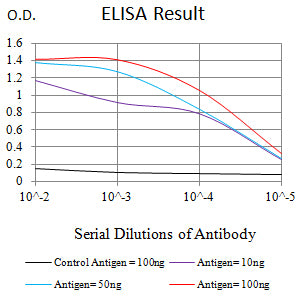
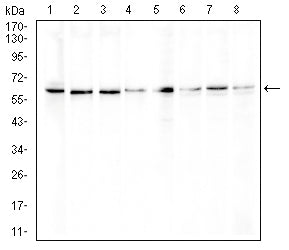
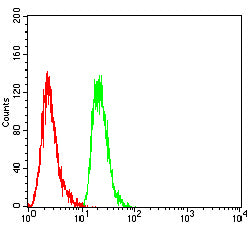
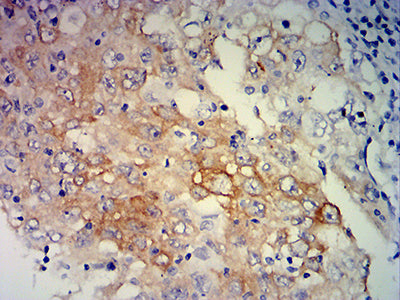
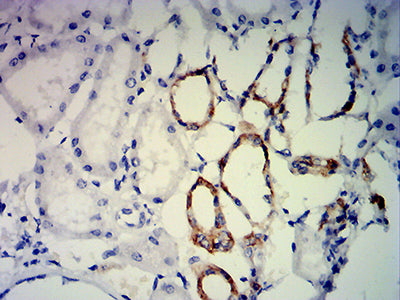
| WB | 1/500 - 1/2000 | Human,Mouse,Rat |
| IF | 咨询技术 | Human,Mouse,Rat |
| IHC | 1/200-1/1000 | Human,Mouse,Rat |
| ICC | 技术咨询 | Human,Mouse,Rat |
| FCM | 1/200-1/400 | Human,Mouse,Rat |
| Elisa | 1/10000 | Human,Mouse,Rat |
| Aliases | UV20; COFS4; RAD10 |
| Entrez GeneID | 2067 |
| clone | 5A2D1 |
| WB Predicted band size | 32.5kDa |
| Host/Isotype | Mouse IgG1 |
| Antibody Type | Primary antibody |
| Storage | Store at 4°C short term. Aliquot and store at -20°C long term. Avoid freeze/thaw cycles. |
| Species Reactivity | Human, Mouse |
| Immunogen | Purified recombinant fragment of human ERCC1 (AA: 1-297) expressed in E. Coli. |
| Formulation | Purified antibody in PBS with 0.05% sodium azide |
+ +
以下是3篇关于ERCC1抗体的代表性文献及其摘要内容:
---
1. **文献名称**: *ERCC1 and cisplatin resistance in non-small cell lung cancer*
**作者**: Olaussen, K.A. et al. (2006)
**摘要**: 该研究通过免疫组化(使用ERCC1抗体8F1)分析肺癌组织中ERCC1蛋白表达水平,发现ERCC1低表达患者对含铂化疗的生存获益更显著,提示ERCC1可能作为铂类化疗反应的预测标志物。
---
2. **文献名称**: *Antibodies against ERCC1 discordancy due to epitope loss in formalin-fixed paraffin-embedded tissue*
**作者**: Bhagwat, N.R. et al. (2011)
**摘要**: 研究比较了多种ERCC1抗体(如8F1、4F9、FL-297)的特异性,发现不同抗体对福尔马林固定石蜡包埋(FFPE)组织的检测结果存在显著差异,部分抗体因抗原表位丢失导致假阴性,强调抗体选择对临床检测的重要性。
---
3. **文献名称**: *Standardization of ERCC1 immunohistochemistry in clinical practice: a call for evidence-based thresholds*
**作者**: Varma, S. et al. (2012)
**摘要**: 文章探讨了ERCC1抗体在不同实验室间检测结果的不一致性,提出需建立标准化的免疫组化评分系统和抗体验证流程,以确保其在指导个体化化疗(如奥沙利铂)中的临床应用可靠性。
---
**核心要点总结**:
- ERCC1抗体广泛用于评估DNA修复能力及化疗敏感性,但抗体特异性、组织处理方法和评分标准显著影响结果可靠性。
- 推荐优先选择经过严格验证(如敲除细胞系验证)的抗体(如部分研究支持FL-297特异性更优)。
ERCC1 (Excision Repair Cross-Complementation Group 1) is a critical protein involved in DNA damage repair, specifically in the nucleotide excision repair (NER) pathway. It forms a heterodimeric complex with XPF (xeroderma pigmentosum group F), which is essential for cleaving damaged DNA strands during the repair of bulky DNA adducts and interstrand crosslinks caused by UV radiation or chemotherapeutic agents like cisplatin. ERCC1's role in maintaining genomic stability has made it a focus in cancer research, particularly in understanding mechanisms of chemoresistance and patient prognosis.
ERCC1 antibodies are widely used as tools to detect and quantify ERCC1 protein expression in tissues or cell lines. In clinical contexts, ERCC1 expression levels are studied as a potential biomarker to predict response to platinum-based chemotherapy. Tumors with high ERCC1 expression often exhibit reduced efficacy of platinum drugs, as enhanced DNA repair capacity may counteract chemotherapy-induced DNA damage. Conversely, low ERCC1 levels are associated with better therapeutic outcomes. However, the reliability of ERCC1 as a standalone biomarker remains debated due to variability in antibody specificity, assay protocols, and tumor heterogeneity.
Research-grade ERCC1 antibodies are also employed in mechanistic studies to explore DNA repair pathways, synthetic lethality interactions, and the development of targeted therapies. Their applications extend to immunohistochemistry, Western blotting, and functional assays, contributing to both basic science and translational oncology.
×